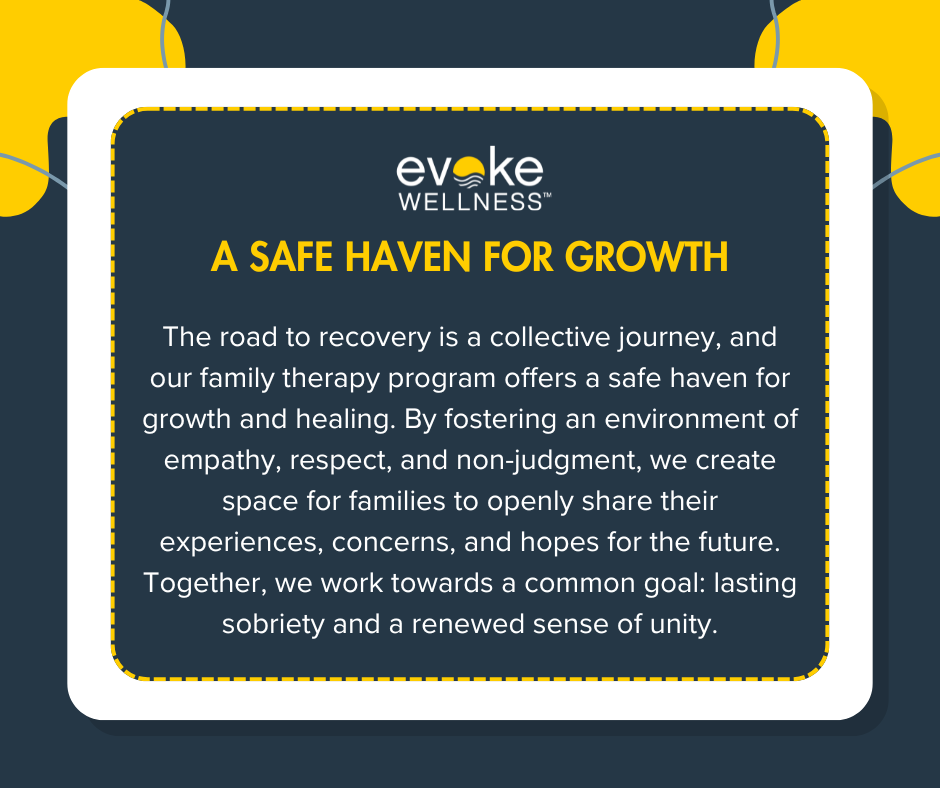As you navigate the challenging journey of addiction recovery, you may wonder about the role your family can play in the detox process. At Evoke Wellness at Hilliard, we understand that addiction affects not just the individual, but the entire family unit. Recent studies show that family therapy can significantly improve treatment outcomes, with one 2021 review finding it increases engagement and reduces relapse rates by up to 35%. Our comprehensive approach integrates family therapy into every stage of recovery, from acute medical detox through residential treatment. By involving your loved ones, you’re not just healing yourself—you’re rebuilding the foundations of your support system for lasting recovery.
Together, let’s embrace the journey to recovery and the promise of a new beginning. Call us at (833) 949-1347 today or reach out online.
Understanding the Impact of Addiction on Families
Addiction is a chronic disease that affects not just the individual, but the entire family system. Witnessing a loved one’s struggle with substance abuse can be emotionally draining, financially burdensome, and create a sense of helplessness. According to a study by the National Center on Addiction and Substance Abuse, addiction costs the average family $24,565 per year in healthcare costs, job loss, legal troubles, and theft.
Emotional Toll
The emotional impact on families is profound. Loved ones often experience a range of emotions, including anger, resentment, fear, and guilt. Children of addicted parents may experience trauma, neglect, and a higher risk of developing mental health issues and substance abuse problems themselves. As reported by the National Institute on Drug Abuse, children with parents who abuse drugs are more likely to experience abuse or grow up in a home with domestic violence.
Strained Relationships
Addiction can strain family relationships, leading to conflicts, trust issues, and communication breakdowns. Enabling behaviors, such as making excuses or covering up for the addicted person’s actions, can further perpetuate the cycle of addiction. A study published in the Journal of Substance Abuse Treatment found that families with a member struggling with addiction often experience higher rates of divorce or separation.
Financial Burden
The financial burden of addiction can be immense. In addition to the cost of treatment and healthcare, families may face legal fees, job loss, and property damage. According to the National Institute on Drug Abuse, addiction treatment costs can range from $1,176 to $6,552 per month, depending on the level of care required.
Importance of Family Therapy
Family therapy plays a crucial role in the recovery process by addressing the systemic impact of addiction. It helps families understand the disease, develop healthy coping mechanisms, and rebuild trust and communication. Evoke Wellness at Hilliard offers a comprehensive family therapy program as part of their addiction treatment services, recognizing the importance of involving loved ones in the healing journey.
Family Therapy: Strengthening Bonds and Improving Communication
The Power of Connection
In the journey towards sobriety, the support of loved ones can be invaluable. Family therapy offers a safe, structured environment to rebuild trust, improve communication, and foster understanding. Through open dialogue and guidance from skilled therapists, family members can work through deeply rooted issues, resolve conflicts, and develop healthier relational dynamics.
A Holistic Approach
At Evoke Wellness, our family therapy program is an integral part of our comprehensive treatment approach. We recognize that substance abuse not only impacts the individual but also ripples through the entire family system. By involving loved ones in the healing process, we empower families to become a source of strength and encouragement.
Tailored to Your Needs
Our family therapy sessions are tailored to address the unique challenges and dynamics of each family. Whether you’re navigating strained relationships, enabling behaviors, or the aftermath of trauma, our therapists provide personalized guidance. Through evidence-based techniques like cognitive-behavioral therapy and psychoeducation, we equip families with the tools to communicate effectively and rebuild trust.

Establishing Healthy Boundaries: Balancing Support and Self-Care
Supporting a loved one through addiction recovery is undoubtedly challenging. Family members often struggle to strike a balance between offering compassionate care and maintaining their own well-being. Evoke Wellness’s family therapy program emphasizes the importance of establishing healthy boundaries – a crucial step towards sustainable healing for all involved.
Prioritizing Self-Care
Caring for someone battling addiction can be physically and emotionally draining. It’s essential to prioritize self-care to avoid burnout and ensure you have the resources to provide effective support. As highlighted in Evoke Wellness’s blog, codependency – an excessive reliance on others for validation – can exacerbate the strain on caregivers. By setting boundaries and engaging in self-care activities, you can cultivate the resilience needed to navigate this journey.
Fostering Open Communication
Healthy boundaries involve open and honest communication. Dialectical Behavior Therapy (DBT), a core component of Evoke Wellness’s treatment approach, emphasizes interpersonal effectiveness skills. These skills can empower families to express their needs, concerns, and limitations clearly and compassionately, fostering mutual understanding and respect.
Embracing a Collaborative Approach
Recovery is a collaborative process that requires the active participation of both the individual in treatment and their support system. By establishing boundaries, families can avoid enabling behaviors and instead focus on providing a structured, supportive environment. Evoke Wellness’s family therapy program encourages families to create a plan that outlines their roles, responsibilities, and expectations, ensuring a cohesive approach to recovery.
Striking the right balance between support and self-care is a delicate yet essential aspect of the recovery journey. By prioritizing self-care, fostering open communication, and embracing a collaborative approach, families can establish healthy boundaries that nurture healing for themselves and their loved ones.
Building a Support Network: Connecting with Others and Accessing Resources
Fostering Connections
Recovery is a journey that is best navigated with the support of others who understand the challenges you face. Peer support groups provide a safe space to connect with individuals who have walked a similar path, offering a sense of belonging and understanding that can be invaluable during difficult times.
Through these connections, you can share your experiences without judgment, receive empathy and different perspectives, and learn new coping strategies from those further along in their recovery. This supportive community can help bridge the gap between isolation and feelings of connectedness, empowering you to take control of your journey.
Accessing Resources
In addition to fostering meaningful connections, it is crucial to access the resources available to support your recovery. Comprehensive treatment programs like residential rehabilitation or intensive outpatient therapy can address the underlying causes of substance abuse and provide evidence-based therapies like Dialectical Behavior Therapy (DBT) to develop essential skills for managing emotions, coping with distress, and improving relationships.
By engaging with these resources, you can build a strong foundation for long-term sobriety, equipping yourself with the tools and support system necessary to navigate challenges and maintain your progress.
Maintaining Momentum
As you transition from detox to ongoing recovery, it is essential to continue nurturing your support network and accessing resources. Participate in support groups and counseling sessions, maintain connections with peers who understand your journey, and explore aftercare services like sober living homes or relapse prevention programs.
Remember, building a robust support network is an ongoing process that requires commitment and effort. By consistently fostering connections and utilizing available resources, you can increase your chances of achieving and maintaining long-term sobriety, one step at a time.
The Power of Family Support in Detox and Recovery
A Crucial Support System
Seeking treatment for addiction can feel daunting and isolating. However, having a strong support network makes a tremendous difference in the detox and recovery journey. Family members play a vital role in providing unwavering encouragement, accountability, and emotional strength during this challenging process. According to Stanford’s Human-Centered AI group, social support is a key protective factor against substance abuse relapse.
Navigating the Detox Phase
As an individual undergoes medical detox, the presence of loved ones can offer immense comfort. Family support helps alleviate feelings of anxiety, depression, and hopelessness that often accompany acute withdrawal symptoms. Evoke Wellness emphasizes the importance of family involvement during this critical phase, fostering a nurturing environment for patients to heal physically and emotionally.
Strengthening the Recovery Foundation
Family therapy programs are a cornerstone of comprehensive addiction treatment. These programs equip families with the tools to understand the complexities of addiction, improve communication, and rebuild trust. Through open dialogue and shared experiences, families can address underlying issues, establish healthy boundaries, and create a solid foundation for long-term recovery.
Ongoing Encouragement and Accountability
Recovery is an ongoing journey, and the role of family support extends far beyond the initial treatment phase. Loved ones serve as a constant source of motivation, reminding individuals of their strength and progress. Participating in a 12-step program also provides a supportive community, fostering a sense of belonging and accountability crucial for sustained sobriety.
With unwavering family support, individuals in recovery can navigate the challenges of detox and embrace a life of lasting freedom from addiction. The power of this unbreakable bond not only aids the healing process but also instills hope for a brighter future.
FAQ: The Role Of Family Therapy In Addiction Treatment
A Crucial Support System
Family therapy plays a vital role in addiction treatment by involving loved ones in the recovery process. When family members understand addiction’s impact, they can provide invaluable support. This improves treatment retention and lowers relapse risks.
At Evoke Wellness, family therapy educates loved ones on addiction. It helps them recognize relapse signs and communicate positively. Family programs prevent judgments and reinforce healthy support networks.
Rebuilding Connections
Addiction strains relationships, but family therapy rebuilds these crucial connections. In a safe environment, patients and families discuss mental health openly. They address communication issues and personal challenges contributing to substance abuse.
This open dialogue promotes understanding on both sides. Family members no longer feel alone in facing addiction’s hardships. Patients gain empathy for their loved ones’ experiences.
Holistic Treatment Approach
At Evoke Wellness, family therapy complements medical detox and other evidence-based therapies. This comprehensive, individualized approach addresses addiction’s root causes for lasting recovery.
Cognitive-behavioral therapy, dialectical behavior therapy, and medication-assisted treatment integrate family support. This holistic care empowers individuals to develop healthy coping skills with their families’ involvement.
Through family programs, Evoke Wellness helps rebuild the supportive relationships critical to preventing relapse. With counseling and education, loved ones become invaluable allies on the path to sobriety.
Conclusion
In conclusion, family therapy plays a crucial role in the detox process, offering support and healing for both patients and their loved ones. By integrating family therapy into medical detox, acute detox, and residential treatment programs, recovery outcomes can be significantly improved. Recent studies show that family involvement increases treatment retention rates by up to 40% and reduces relapse rates by 15-25%. As you consider treatment options, remember that a comprehensive approach including family therapy can provide the foundation for lasting recovery. By addressing family dynamics and fostering open communication, you and your loved ones can work together to overcome addiction and build a healthier future.
Begin Your Journey with Evoke Wellness at Hilliard
If you or a loved one is considering treatment, Evoke Wellness at Hilliard invites you to contact us. Our compassionate team is ready to answer your questions, discuss your needs, and help you take the first steps toward recovery. In Hilliard, you’ll find more than just a treatment program – you’ll discover a community dedicated to your wellness and success. Together, let’s embrace the journey to recovery and the promise of a new beginning. Call us at (833) 949-1347 today or reach out online.


